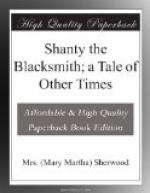“I want a horse-shoe,” he replied.
“A horse-shoe!” returned the blacksmith, “and where’s your horse?”
“I has no other horse than Adam’s mare,” he replied; “I rides no other, but I want a horse-shoe.”
“You are a pretty fellow,” returned Shanty “to want a horse-shoe, and to have never a horse to wear him.”
“Did you never hear of no other use for a horse-shoe, besides protecting a horse’s hoof?” replied the youth.
“I have,” returned the blacksmith, “I have heard fools say, that neither witch nor warlock can cross a threshold that has a horse-shoe nailed over it. But mind I tell you, it must be a cast shoe.”
“Well” said the young man, “suppose that I am plagued with one of them witches; and suppose that I should have bethought me of the horse-shoe, what would you think of me then? What may that be which you are now shaping; why may it not serve my turn as well as another? so let me have it, and you shall have its worth down on the nail.”
“Did not I tell you,” said Shanty, sullenly, “that it must be a cast shoe that must keep off a witch; every fool allows that.”
“Well,” said the young man, looking about him, “have you never a cast shoe?”
“No,” replied Shanty, “I have none here fit for your turn.”
“I am not particular,” returned the young man, “about the shoe being an old one; there is as much virtue, to my thinking, in a new one; so let me have that you are about.”
“You shall have none of my handiworks, I tell you,” said Shanty, decidedly, “for none of your heathenish fancies and follies. The time was when I lent myself to these sort of follies, but, thank my God, I have learned to cast away, aye, and to condemn such degrading thoughts as these. Believe me, young man, that if God is on your side, neither witch nor warlock, or worse than either, could ever hurt you.”
“Well,” said the young man, “if you will not make me one, will you let me make one for myself?”
“Are you a smith?” said Mr. Dymock, before Shanty could reply.
“Am I a smith?” answered the young man; “I promise you, I should think little of myself if I was not as much above him, (pointing to Shanty, who was hammering at his horse-shoe, with his back towards him,) as the sun is brighter than the stars.”
Shanty took no notice of this piece of insolence; but Mr. Dymock having asked the stranger a few more questions, proceeded to show him the job he wanted done to his plough, and from one thing to another, the young man undertook to accomplish it in a few hours, if the master of the shed would permit. Shanty did by no means seem pleased, and yet could not refuse to oblige Mr. Dymock; he, however, remarked, that if the coulter was destroyed, it was no odds to him. The young stranger, however, soon made it appear that he was no mean hand at the work of a blacksmith; he had not only strength, but skill and ingenuity, and in a short time had so deeply engaged the attention of Dymock by his suggestions of improvements to this same plough, that the young laird saw none but him, and allowed the evening to close in, and the darkness of night to cover the heath, whilst still engaged in talking to the stranger, and hearkening to his ingenious comments on the machinery of the plough.




